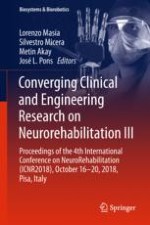2019 | OriginalPaper | Buchkapitel
Feasibility of Submaximal Force Control Training for Robot–Mediated Therapy After Stroke
verfasst von : Guillermo Asín-Prieto, Aitor Martínez-Expósito, Fady Alnajjar, Shingo Shimoda, José L. Pons, Juan C. Moreno
Erschienen in: Converging Clinical and Engineering Research on Neurorehabilitation III
Aktivieren Sie unsere intelligente Suche, um passende Fachinhalte oder Patente zu finden.
Wählen Sie Textabschnitte aus um mit Künstlicher Intelligenz passenden Patente zu finden. powered by
Markieren Sie Textabschnitte, um KI-gestützt weitere passende Inhalte zu finden. powered by
